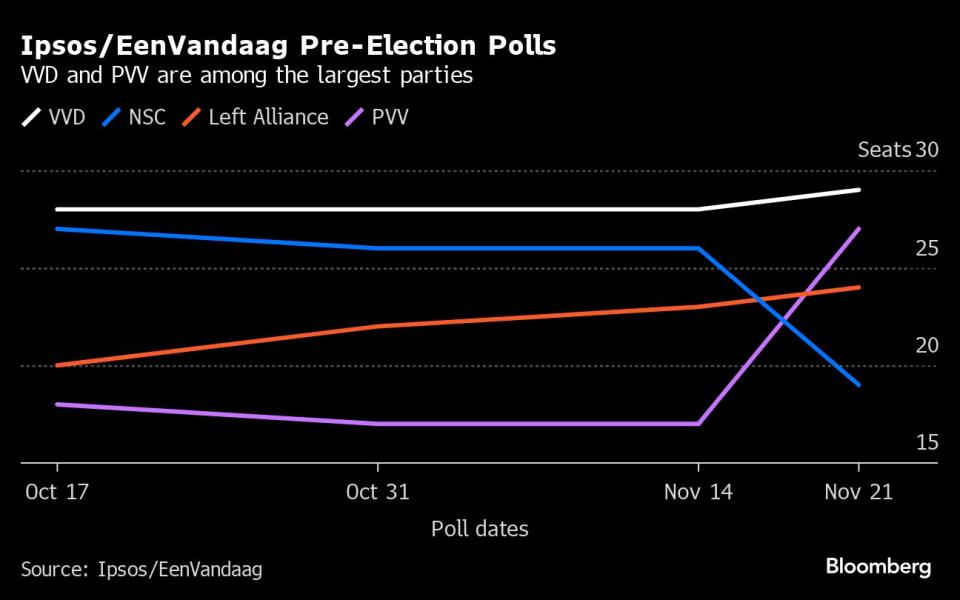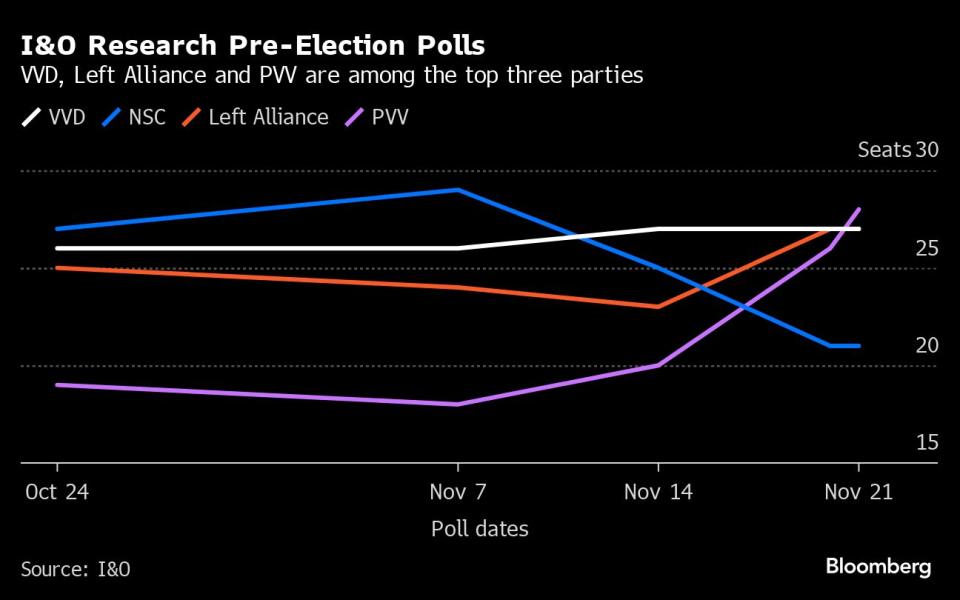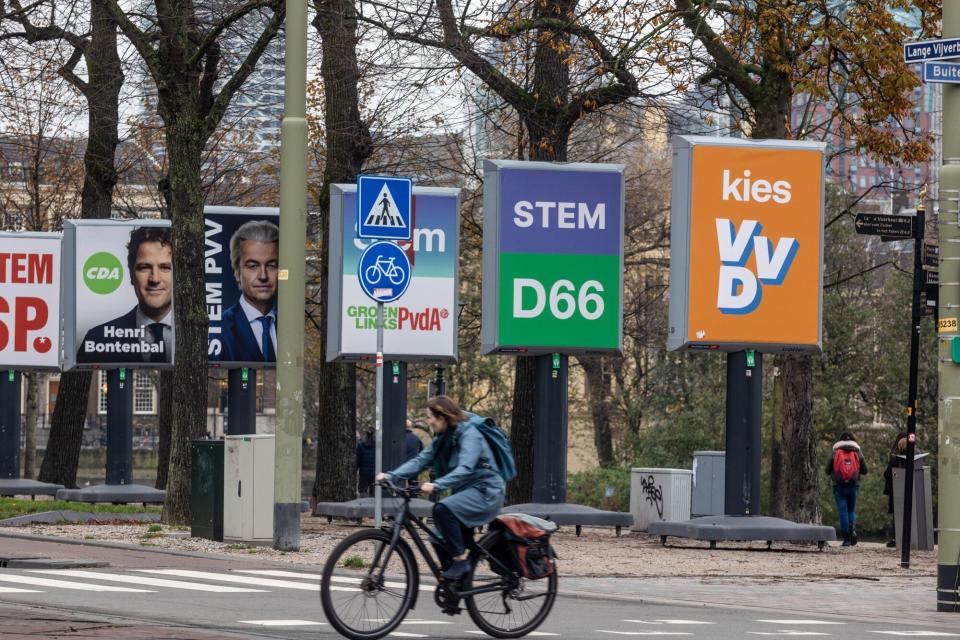Dutch Far Right in the Ascent on Day of Vote: What to Watch
(Bloomberg) -- Whatever the question posed in recent Dutch elections, the answer returned by the electorate was always Mark Rutte.
Most Read from Bloomberg
McKinsey and Its Peers Are Facing the Wildest Headwinds in Years
Hulu for $1, Max for $3: Streaming Services Slash Prices This Black Friday
OpenAI Engineers Earning $800,000 a Year Turn Rare Skillset Into Leverage
Sam Altman, OpenAI Board Open Talks to Negotiate His Possible Return
Now, for the first time in 13 years, the Dutch are voting in an election without their longest-serving premier on the ballot, and the field is suddenly wide open. There is little certainty that Dilan Yesilgoz-Zegerius, Rutte’s successor as party leader, can maintain the center-right VVD as parliament’s largest bloc.
According to the latest polls, Geert Wilders’s far-right PVV was suddenly in contention after months trailing outside the top three. If his position holds the question will be whether he can convince coalition partners, some of whom have ruled out working with the far-right lawmaker.
This election could serve up many firsts: if Yesilgoz-Zegerius is victorious, the Netherlands could get its first female prime minister, and the first who came to the country as a refugee. If Wilders can stretch the electoral math in his favor, the highest political office would be occupied by a politician once censured by the courts for insulting people of Moroccan descent.
Here’s what to look out for as voting gets under way:
Who’s on the ballot?
Many, many candidates. Parliament has 150 seats and the various polls’ first-placed parties are projected to collect only 28 of them. This makes a coalition all-but inevitable.
The field is most crowded on the right, where three of the leading four parties are clustered. Wilders and Yesilgoz-Zegerius are among them but so is Pieter Omtzigt, once a member of the Christian Democrats but who has been outperforming his old party since forming a new vehicle of his own, New Social Contract, or NSC.
On the left, the polls suggest Frans Timmermans has a strong shot. He resigned as the European Union’s climate chief — a position from which he spearheaded the EU’s Green Deal — to stand in these elections, where he leads an alliance of Labor and the Green Left.
These four candidates are projected to get between 21 and 28 seats each, according to the latest polls, and there is a long tail of smaller parties also likely to end up in parliament.
Who’s going to end up Prime Minister?
The hardest question to answer, because even the final results expected next week won’t be determinative. It is usual in the Netherlands that the leader of the biggest party becomes premier in a coalition. But that’s not a hard-and-fast rule.
To complicate matters further, Timmermans, Wilders and Yesilgoz-Zegerius have all said they’re prime ministerial hopefuls, while Omtzigt hasn’t been so clear on his ambitions vis-a-vis the top job.
How is the government formed?
The last time round, four parties were needed to broker a majority and negotiations took a record nine months.
The newly-elected members of parliament will take up their positions on Dec. 6 but the government itself is formed from a cabinet of individuals who won’t end up sitting among them — and could even be appointed in from outside. It’s likely that the outgoing caretaker government led by Rutte could preside for a while.
What are the main issues?
Migration has been at the center of debate as the VVD, PVV and NSC devote much of their campaign to the topic. Yet polls suggest voters’ main concerns lie with the rising cost of living and housing shortages across the Netherlands.
Read More: The Dutch Question Centuries of Openness as They Go to the Polls
Who’s likely to ally with whom?
Yesilgoz-Zegerius’s VVD and Timmermans’s Left Alliance have suggested they are unlikely to end up as coalition partners. But both parties have independently said they’re open to partnering with Omtzigt’s NSC.
Whether Omtzigt wins or not, he could play a role in deciding the makeup of the next cabinet. He appeals to voters from both the left and right with an election program that has conservative fiscal but left-wing social measures. He came to prominence exposing the child-benefits scandal that toppled Rutte’s third coalition government in December 2020.
And Wilders?
Timmermans has ruled out governing with the PVV lawmaker, while his rivals to the right have been more circumspect. Wilders is known for his anti-Islamic stance, with a slate of policies that include banning the wearing of head scarves in government buildings. He has also promised to put a stop to Dutch aid to Ukraine.
But lately, Wilders has hinted a willingness to put some of his views “in the fridge” to make cooperation with other right-wing parties possible.
Wilders supported Rutte’s very first coalition government after 2010. But the partnership was short-lived, and the outgoing premier ruled out further cooperation after Wilders made comments about Moroccans for which he was convicted on insult charges in 2020.
Rutte’s successor at the VVD Yesilgoz-Zegerius has opened the door to cooperation with Wilders.
When will we get the first results?
Voting begins at 7:30 a.m. and ends at 9 p.m. on Wednesday. Dutch broadcaster NOS will publish its first exit poll at 9 p.m.
How will the elections impact the Netherlands’ relations with the European Union?
The Netherlands has long had a reputation of being fiscally conservative, and has been able to exercise influence over others in the European Council owing to Rutte’s experience and seniority. Timmermans, as a long-term EU commissioner, has also been an authoritative voice in Brussels over the past nine years.
Omtzigt has positioned himself as more of a euroskeptic, though has balked at the word itself. He told Bloomberg that he wants opt-outs from EU programs, and opposes any form of joint EU debt. Wilders wants a full exit from the European Union.
Most Read from Bloomberg Businessweek
How Elon Musk Spent Three Years Falling Down a Red-Pilled Rabbit Hole
More Americans on Ozempic Means Smaller Plates at Thanksgiving
Guatemalan Town Invests Remittance Dollars to Deter Migration
©2023 Bloomberg L.P.





